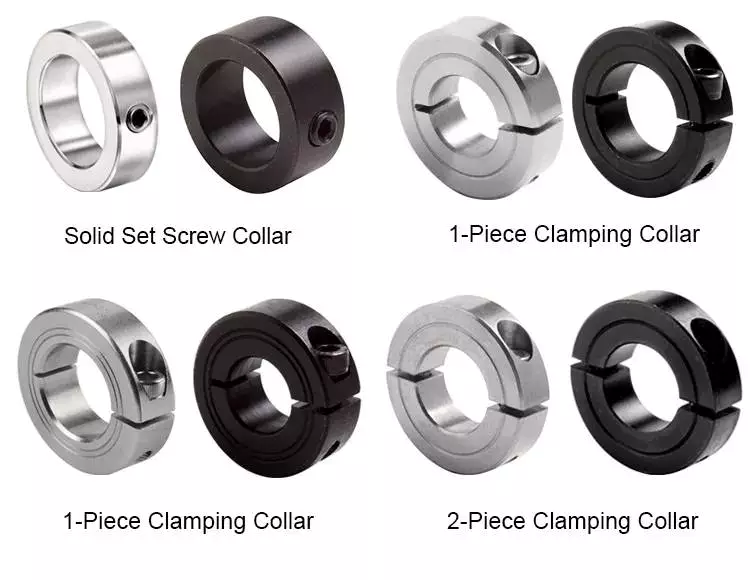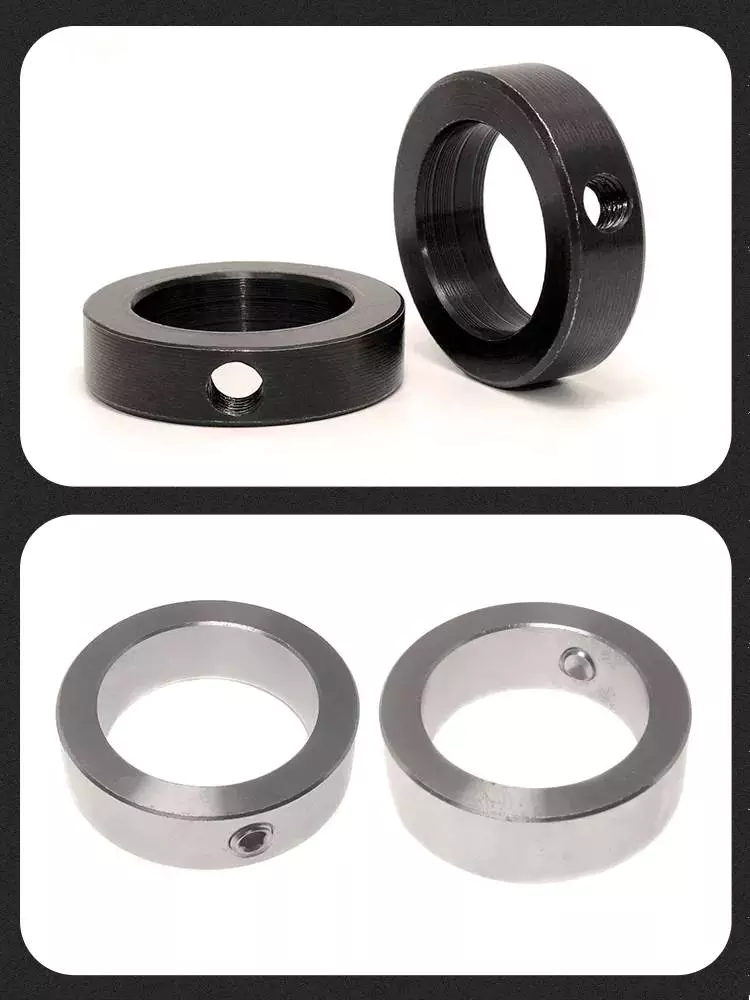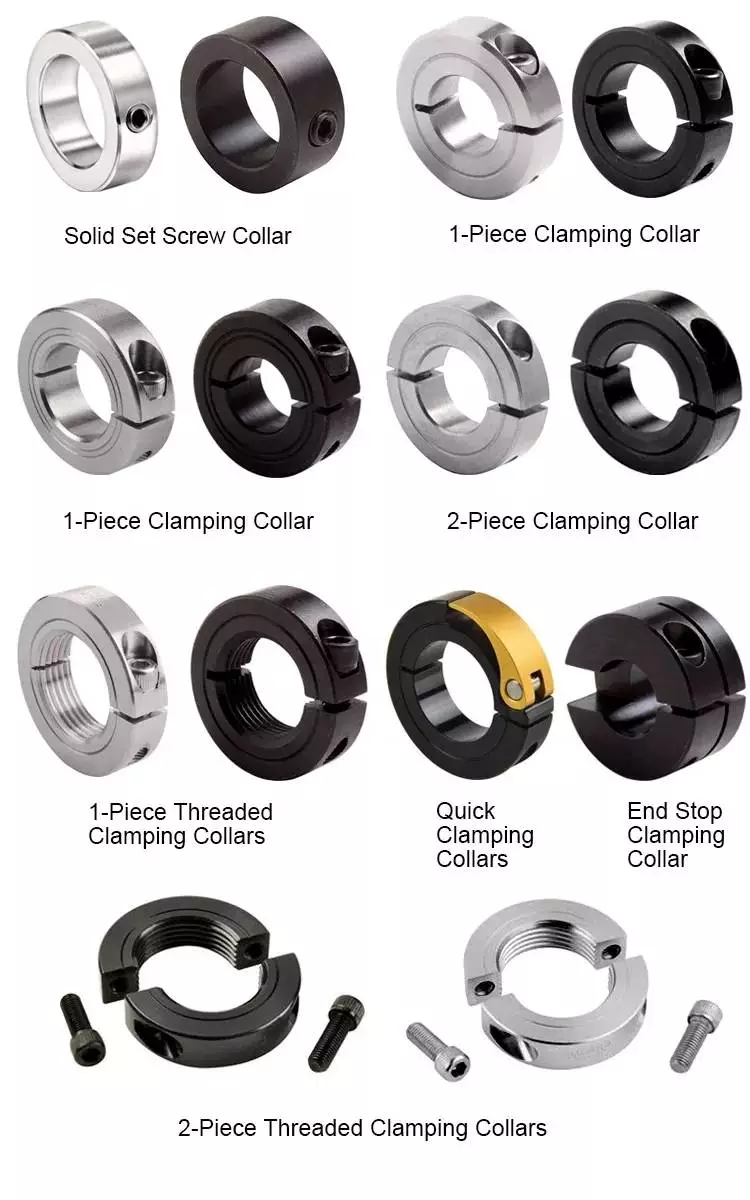Product Description
Product Description
TWO-PIECES
easily installed and disassembled, reducing labor and downtime when adjustment, removal, or replacement is necessary. The two-piece shaft collar uses the full seating torque of its forged screws to apply a uniform distribution of forces around the shaft’ circumference. These clamping forces provide the collar with a holding power superior to one-piece and set screw shaft collars. we keeps both halves of the split collar together throughout the manufacturing process to assure a perfect match for proper fit, alignment, and holding power. This process also makes the two-piece collar more adaptable to shafts which vary a small amount from nominal size. we manufactures two-piece clamp shaft collars in 12l15 lead-free steel with a zinc or proprietary black oxide finish, 303 and 316 stainless steel, high-strength 2571 aluminum with or without an anodize finish, titanium, and engineered plastic. Bore sizes range from 1/8″ to 6″ and 3mm to 150mm.
1.materials:stainless steel,alloy steel ,aluminum ,brass etc.
2.Finish: Zinc plating, Nickel plating,nature
3.competitive price ,prompt delivery
4.OEM service as your drawings
Technics
1.Milling 2.grinding 3.Turning 4.wire-cutting 5.CNC bending 6.CNC machining 7.Stamping 8.forging 9.boring 10.broaching and so on .
Accuracy
1.Milling:0.01mm 2.Turning:0.01mm 3.Grinding:0.002mm 4.Wire-cutting :0.005mm 5.CNC Machining : 0.005mm
Production ability
|
EQUIPMENT LIST |
||||
|
NAME
|
SPECIFICATION |
BRAND |
ORIGINAL PLACE |
QUANTITY |
|
CNC Machines |
Graph 600 |
KNUTH |
CHINA |
20 |
|
1370 |
KAFO |
TAPAN |
20 |
|
|
EDM Machines |
ZNC450 |
BHangZhouNA |
ZheJiang |
20 |
|
ZNC430 |
BHangZhouNA |
ZheJiang |
30 |
|
|
Grinding Machines |
ACC-350ST |
BESFORD |
CHINA |
50 |
|
Auto Lathe Machining |
L150G-II |
OKUMA |
CHINA |
80 |
|
Wire Cutting Machines |
DK7732 |
NEW FAST |
CHNA |
30 |
|
Milling Machine |
SHCM-97A |
GENTIGER |
ZheJiang |
20 |
|
CMM Machine |
CRT-PA574 |
MITUTYO |
JAPAN |
10 |
|
Hardness Tester |
TILO-T60 |
MITUTYO |
JAPAN |
5 |
Productions showing:
| More Detail Informations | |
| Sample Available |
1.Sample is free of charge if we have the existing,you only need to pay the freight cost.Sample will be provided within 3 to 10 working days. 2.If the products is non-standard and no existing tooling inventory,The full mould cost needed prepaid, sample will be provided within 7 to 15 working days, you’ll pay the freight cost. |
| MOQ | 1pcs |
| Pricing Term | EXW HangZhou ,FOB,CIF,CNF,DDU,etc. |
| Payment Term | TT(30% in advance as deposit,balance before delivery),L/C,Western Union,PayPal etc. |
| Port of loading | HangZhou port or ZheJiang port. |
| Lead Time | 15-35 working days after order and deposit received. |
| Warranty |
1.We shoulder the ability based on product categories to determine the warranty, and guarantee more than 18 months. 2.We don’t assume responsibility for the damage which is caused by indirect, accidental events at anytime anywhere. |
Founded in 2005,HangZhou HC Co.,Ltd is an IATF16949:2016 manufacturer.We have more than 20 years of production experience in the production of cnc machining/Milling parts,cold forming,graphite products, We not only have new imported prodution equipment and spacious storage space,but also have a group of experienced workers and professional engineering R & D team.Therefore, our company has enough strength to meet the needs of customers.
Equipments & Working plant:
Worry about our quality problem?
We are an IATF16949:2016 Certifed supplier, strictly execute inspection on ISO quality control system. All our products will pass 10-step inspections: it starts from incoming material inspection to IPQC, then FQC and final inspection with reports before shipment.
Packing:Generally carton or wooden case or plastic foam with standard export wooden pallet , or as per consumer’s requirements.
Certifications:
Your Satisfaction, Our Motivation!
FAQ
Q1. Are you factory or trading company?
A: We are a customized factory with independent oversea trading office .
Q2.Can you provide sample for us?
A: Yes, free sample is available
Q3. What raw material do you use?
A: Stainless Steel, Carbon Steel, Mild Steel, Galvanized Steel, Aluminum alloy, brass, copper, Aluminum etc.
Q4. What finishes can you provide?
A: powder coating, polishing, zinc/nickel /chrome plating, painting, anodized, hot dip galvanized, sandblasted etc.
Q5. How do you ensure quality control?
A: We inspect every process based on your drawings or samples and also check the products before packing
Q6. Is small quantity available?
A: Yes, Small quantity for trial order is available.
Q7. How do you ship the goods?
A: We have our cooperation forwarder, they can deliver the goods to you in very short time with competitive price, and you can ship by your own agent as your convenience.
Q8. How about your delivery time ?
A: 3-10 days for samples and 15-45 days for mass production .
Q: How To Place A Order?
* You send us drawing or sample
* We make the sample and send it to you
* You think the sample is good then place an order and pay us 30% deposit
* We start to make the product
* When the goods is done, we take photoes for your check and you then pay the balance
* We deliver the products to courier company
/* March 10, 2571 17:59:20 */!function(){function s(e,r){var a,o={};try{e&&e.split(“,”).forEach(function(e,t){e&&(a=e.match(/(.*?):(.*)$/))&&1
| Application: | Auto and Motorcycle Accessory, Machinery Accessory |
|---|---|
| Standard: | GB, EN, JIS Code, TEMA, ASME |
| Surface Treatment: | Anodizing |
| Production Type: | Mass Production |
| Machining Method: | CNC Turning |
| Material: | Nylon, Steel, Plastic, Alloy, Aluminum |
| Samples: |
US$ 10/Piece
1 Piece(Min.Order) | |
|---|
| Customization: |
Available
| Customized Request |
|---|
Can I get recommendations for shaft collars suitable for use in harsh environments?
Yes, there are specific types of shaft collars that are designed to withstand harsh environments and provide reliable performance. When selecting shaft collars for use in such conditions, it is important to consider factors such as temperature extremes, exposure to moisture or chemicals, abrasive environments, and high vibration or shock. Here are some recommendations for shaft collars suitable for use in harsh environments:
- Stainless Steel Shaft Collars: Stainless steel shaft collars are highly resistant to corrosion and can withstand harsh environments with exposure to moisture, chemicals, or abrasive substances. They offer excellent durability and are suitable for applications in industries such as marine, food processing, chemical processing, or outdoor equipment where reliability and resistance to rust and corrosion are critical.
- Plated Shaft Collars: Plated shaft collars, such as zinc-plated or nickel-plated collars, provide an added layer of protection against corrosion and wear. These collars are often used in harsh industrial environments where exposure to chemicals, humidity, or outdoor elements is a concern. The plating helps to prevent rust and can extend the lifespan of the collars in challenging conditions.
- Shaft Collars with Seals or Gaskets: Some shaft collars are designed with integrated seals or gaskets to provide additional protection against moisture, dust, and contaminants. These collars create a barrier between the collar and the shaft, preventing the entry of debris or liquids. They are commonly used in applications where water or dust ingress is a potential issue, such as outdoor equipment, agricultural machinery, or industrial machinery in dusty environments.
- High-Temperature Shaft Collars: For harsh environments with high-temperature conditions, it is important to select shaft collars that can withstand the heat without deformation or degradation. High-temperature shaft collars, often made from heat-resistant alloys or ceramics, are designed to handle extreme temperatures. These collars are suitable for applications in industries such as aerospace, automotive, or furnace equipment where exposure to high heat is a concern.
- Specialized Coatings or Materials: In some cases, specialized coatings or materials can be applied to shaft collars to enhance their resistance to specific harsh conditions. For example, coatings such as Teflon or epoxy can provide additional protection against chemicals or abrasion. Additionally, certain materials like titanium or Hastelloy offer superior resistance to corrosion and can be utilized in highly corrosive environments.
When choosing shaft collars for harsh environments, it is recommended to consult with manufacturers or suppliers who have expertise in providing solutions for challenging conditions. They can offer guidance on selecting the most suitable collar materials, designs, and additional features based on your specific application requirements and the severity of the harsh environment.
What are the advantages of using two-piece vs. one-piece shaft collars?
When considering shaft collars, you may come across two main types: two-piece and one-piece shaft collars. Each type has its advantages depending on the specific application and requirements. Here are the advantages of using two-piece and one-piece shaft collars:
Advantages of Two-Piece Shaft Collars:
- Easy Installation and Removal: Two-piece shaft collars are designed to be split into two halves, allowing for easy installation or removal on a shaft without the need to disassemble other components or move the shaft. This can save time and effort during installation or maintenance procedures.
- Positioning Flexibility: Two-piece collars often have a clamping mechanism that allows for fine adjustment and precise positioning along the shaft. This can be advantageous when precise placement is required, such as aligning components or achieving specific clearance or spacing.
- Accessibility for Retrofitting: In situations where it may be difficult or impractical to slide a collar onto the end of a shaft, two-piece collars provide a convenient retrofitting solution. They can be installed around the shaft by opening the collar and clamping it in place, making them suitable for retrofitting on existing shafts or equipment without requiring shaft disassembly.
- Shaft Protection: Two-piece collars typically have a split design with smooth, rounded edges, which helps prevent damage to the shaft during installation or removal. The collar halves can distribute clamping forces evenly, reducing the risk of shaft deformation or scoring.
- Collar Customization: Two-piece collars often offer more customization options, such as the ability to replace or interchange collar components, add features like mounting holes or attachment points, or modify the collar to accommodate specific shaft sizes or configurations.
Advantages of One-Piece Shaft Collars:
- Simplicity and Compactness: One-piece shaft collars have a simple, solid construction without any moving parts or additional components. This makes them compact and easy to handle, and they require less space along the shaft compared to two-piece collars.
- Cost-Effectiveness: One-piece collars are often more cost-effective than two-piece collars due to their simpler design and manufacturing process. They can be a budget-friendly option for applications where precise positioning or frequent adjustments are not required.
- High Clamping Force: One-piece collars can provide high clamping force due to their solid construction and uniform distribution of pressure. This makes them suitable for applications where a secure and rigid connection between the collar and the shaft is crucial.
- Low Maintenance: Since one-piece collars do not have moving or adjustable parts, they typically require less maintenance. Once installed, they provide a reliable and stable connection without the need for periodic adjustments or repositioning.
- Compatibility with High-Speed Applications: One-piece collars are generally well-suited for high-speed applications due to their solid construction and balanced design, which can minimize the risk of imbalance or vibration at high rotational speeds.
Ultimately, the choice between two-piece and one-piece shaft collars depends on factors such as the specific application requirements, ease of installation or retrofitting, customization needs, cost considerations, and desired level of adjustability or precision. It is important to evaluate these factors and select the type of shaft collar that best suits your needs for optimal performance and functionality.
What are the key features to consider when selecting shaft collars for specific machinery?
When selecting shaft collars for specific machinery, there are several key features to consider. These features help ensure that the chosen shaft collars are compatible with the machinery and can perform effectively in the intended application. Here are the key features to consider:
- Shaft Size and Material: The first consideration is the size and material of the shaft. Shaft collars are available in various sizes to accommodate different shaft diameters. It is crucial to accurately measure the shaft diameter and choose a collar that matches it. Additionally, consider the material of the shaft, such as steel, stainless steel, or aluminum, and select a collar material that is compatible with it to prevent galvanic corrosion or other compatibility issues.
- Collar Material: Shaft collars are available in different materials, including steel, stainless steel, aluminum, and plastic. The choice of collar material depends on factors such as the application environment, load requirements, and desired durability. For example, stainless steel collars are often preferred for corrosive or high-temperature environments, while plastic collars may be suitable for lighter-duty applications or situations where avoiding marring or scratching the shaft is important.
- Collar Type: Consider the type of collar that best suits the specific machinery and application. The common collar types include set screw collars, clamping collars, one-piece solid collars, two-piece split collars, threaded collars, hinged collars, flanged collars, and specialty collars. The choice depends on factors such as ease of installation, adjustability, space limitations, and the need for specific features like indexing, quick release, or torque limiting.
- Load Capacity: Evaluate the load capacity requirements of the machinery. The shaft collars should be capable of withstanding the expected loads and forces without deformation or failure. Consider factors such as the torque, axial force, and radial force that the collar will experience in the application and choose a collar with an appropriate load rating to ensure reliable and safe operation.
- Operating Conditions: Take into account the operating conditions in which the machinery operates. This includes factors such as temperature, humidity, vibration, and exposure to chemicals or contaminants. Ensure that the chosen shaft collars are designed to withstand these conditions and have appropriate corrosion resistance, temperature tolerance, and environmental sealing if needed.
- Installation and Adjustment: Consider the ease of installation and adjustment of the shaft collars. Some collars, such as set screw collars, are relatively easy to install and require minimal tools. Others, like clamping collars, may require more complex assembly or adjustment procedures. Choose a collar that aligns with the available installation and adjustment methods in your machinery and suits the desired level of convenience or precision.
- Compatibility with Other Components: Assess the compatibility of the shaft collars with other components in the machinery, such as bearings, gears, pulleys, or couplings. Ensure that the collar design and dimensions allow for proper alignment, clearance, and interaction with these components. Consider any specific requirements or constraints imposed by the machinery design or the need to interface with existing components.
- Cost and Availability: Finally, consider the cost and availability of the chosen shaft collars. Compare prices from different suppliers or manufacturers to ensure that the collars offer good value for money. Additionally, assess the availability of the collars from reliable sources to avoid delays or difficulties in obtaining replacements or additional collars when needed.
By carefully considering these key features, you can select shaft collars that are well-suited for the specific machinery, ensuring proper functionality, reliable performance, and compatibility with the application requirements.
editor by CX 2024-01-12




